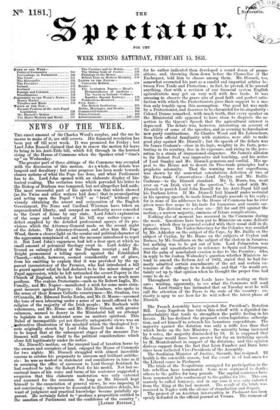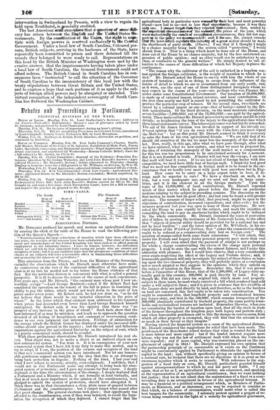The French Assembly have rejected the President's Dotation Bill. Louis
Napoleon has taken this rebuff with a dignified im- erturbability that tends to strengthen the public feeling in his favour. He has declined the proposed extra-legislative subscrip-
tion, and set himself to retrench his luxurious expenditure. The majority against the dotation was only a trifle less than that which broke up the late Ministry ; the minority being increased by 8 votes, the majority diminished by 19. It is supposed that the change would have been greater but for an irritating speech by M. Montalembert in support of the dotation ; and this opinion derives support from the fact that Leon Faucher and Darn have since been reelected Vice-Presidents of the Assembly. The Sardinian Minister of Justice, Siccardi, has resigned. Ill health is the ostensible reason, but the event is of bad omen for the Liberal cause in Piedmont.
The trials of the Neapolitans arraigned for participation in the late rebellion have terminated. Some were sentenced to death ; others to the gallies for long periods. The capital sentences have been commuted into confinement to the gallica for life. This can scarcely be called leniency, and in one case it was only extorted from the King at the last moment. The result of the trials was received in Naples with the silence of stupefaction and despair. The project of an Austrian intervention in Piedmont has been openly defended in the official journal at Vienna. The rumour of
intervention in Switzerland by Prussia, with a view to regain its hold upon Neufchatel,is generally credited.
The last American' MO alinottnalett that it lefestiott of some, &a% cacy has arisen betweere the Englisli and lie Unitt& States ea- vernments. By the constitution: of the -Quiet% the, night to nego- tiate with foreign powers is reserved excfusivellit to tie Cefli Government. Under a local law of South Carolina, Coloured per- sons, British subjects, arriving in the harbours of the State, have repeatedly been committed to prison and there detained till the vessels they belonged to were ready to sail. Representations on this head by the British Minister at Washington were met by the evasive answer, that the imprisonments having taken place under a. local law of South Carolina, the General Government oould not afford redress. The British Consul in South Carolina has in con- sequence been "instructed" to call the attention of the Governor of South Carolina to the inconsistency of this local law with the freaty stipulations between Great Britain and the United States, and to express a hope that such portions of it as apply to the sub- jects of foreign allied powers may be abrogated or amended. This virtual recognition of the independent sovereignty of South Caro- lina has fluttered the Washington Cabinet.



























